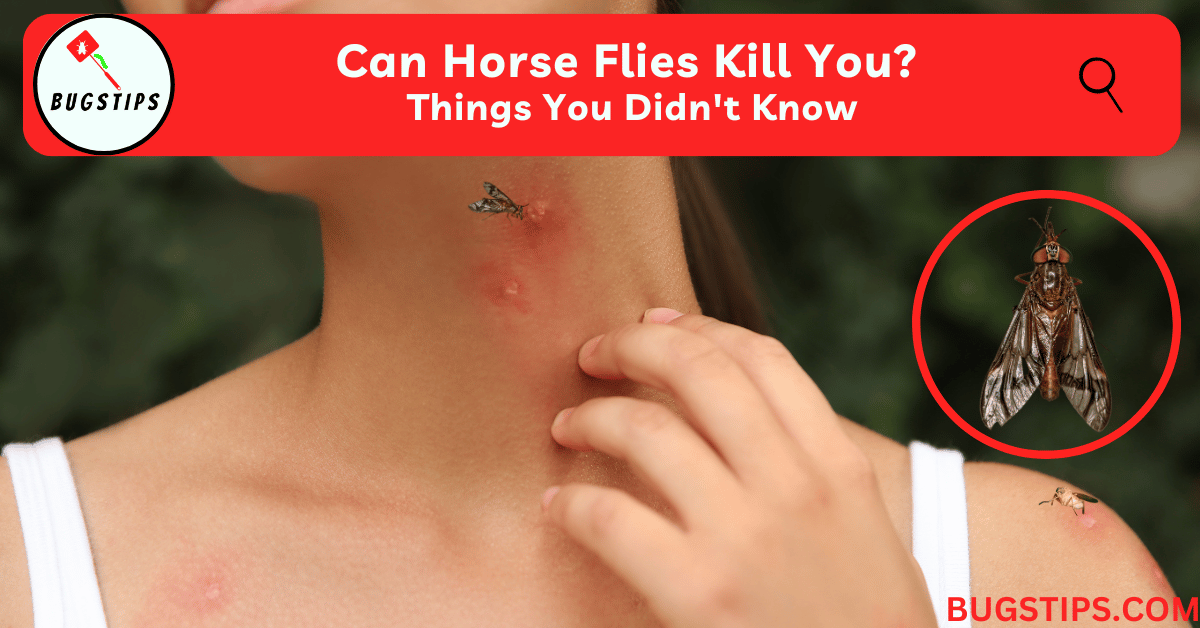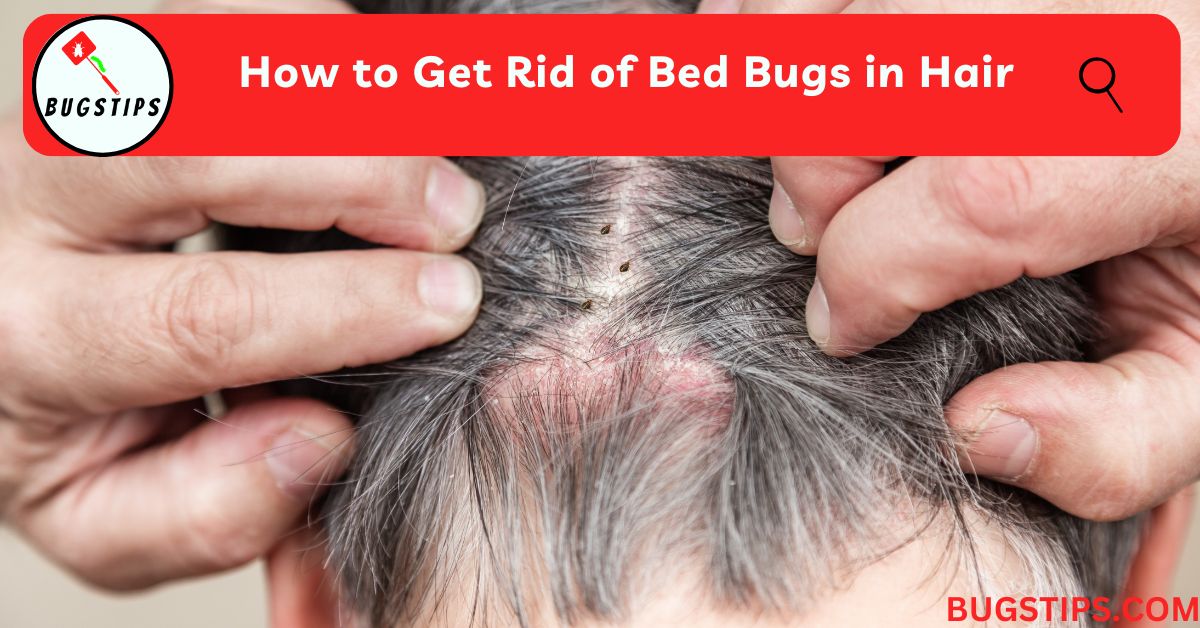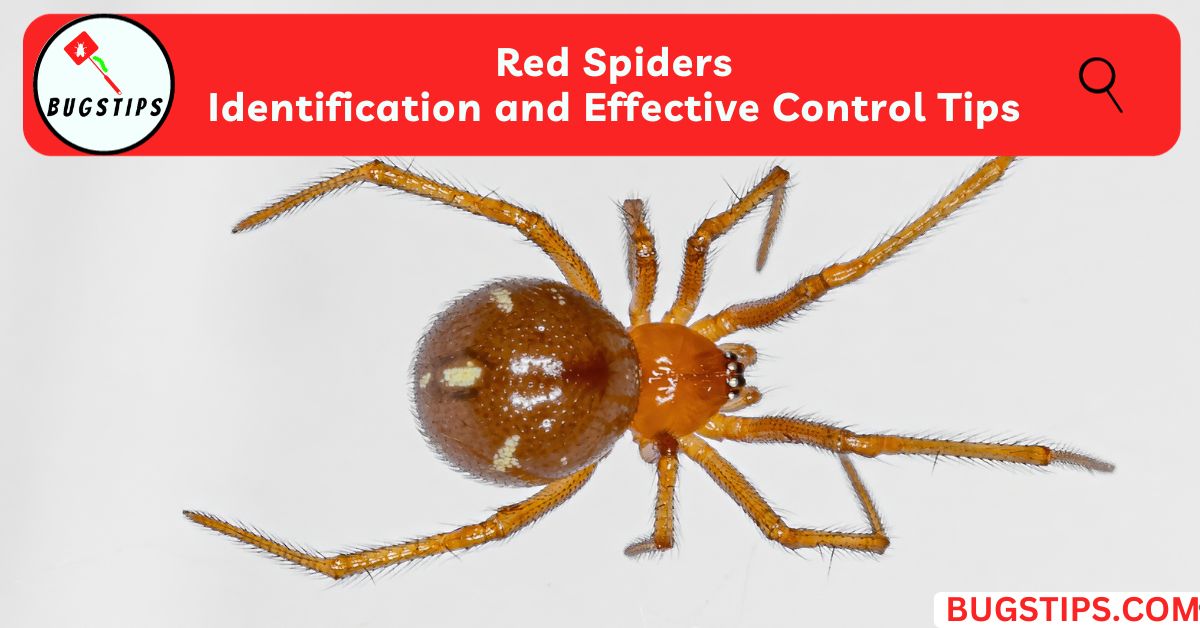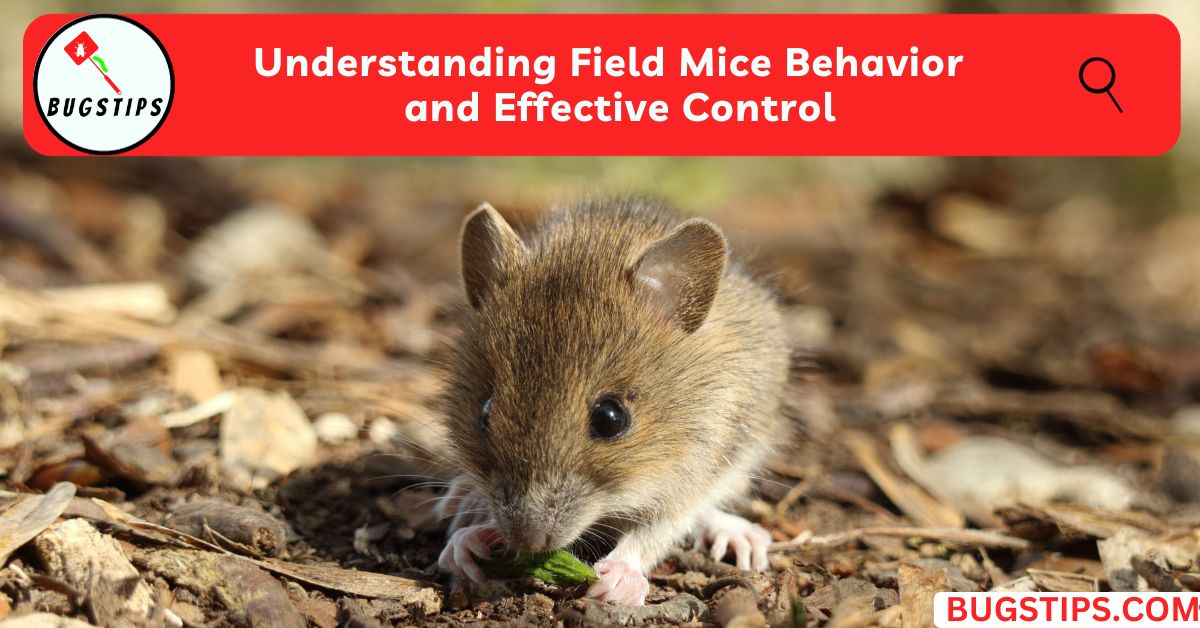This post may contain affiliate links which means as an Amazon Associate, this site may earn a small commission on qualified purchases made through links at no extra cost to you. Learn more on Affiliate Disclosure
As summer approaches, many people will be spending more time outdoors, enjoying the warm weather and sunshine.
However, with the good comes the bad, and one of the downsides of spending time outside is encountering pesky insects like horse flies.
These biting insects are known for their painful bites, but can horse flies kill you?
In this article, we’ll explore the truth about these insects and what you need to know to protect yourself.
What Are Horse Flies?
Horse flies, those notorious insects that can turn a peaceful outdoor experience into a buzzing battle, belong to the family Tabanidae which is a family of biting flies found throughout the world.
Unlike regular house flies, horse flies are larger and more robust, making them easily distinguishable.
These true flies boast impressive agility in flight, and their bodies typically measure between 10 to 30 millimeters in length, sporting a gray or blackish hue.
Related Article – Gnats vs Fruit Flies | Spotting the Difference
Can Horse Flies Kill You?
While horse flies are known to bite humans, there is no evidence to suggest that they can kill humans.
Unlike other biting insects like mosquitoes and ticks, horse flies are not known vectors for any human diseases.
However, in rare cases, people may have an allergic reaction to a horse fly bite.
An allergic reaction can cause symptoms like difficulty breathing, hives, or swelling of the face, lips, tongue, or throat.
In severe cases, anaphylaxis can occur, which is a severe and potentially life-threatening allergic reaction.
So No, horse flies cannot kill humans.
You May Also Like – Truth About Mosquito Eaters
Understanding Horse Fly Bites
Horse fly bites can be a painful and uncomfortable experience.
Here’s what you need to know about horse fly bites.
What Does a Horse Fly Bite Look Like?

- When bitten by a horse fly, the skin can quickly turn red, becoming itchy and raised.
- Within minutes, the bite may develop into large, red, itchy, and swollen bumps.
- In some cases, a raised rash, known as hives or urticaria, may also appear around the bite area.
- The bite can cause inflammation, itchiness, and even bruising in some instances.
Does Horse Fly Bites Hurt?
- Yes! Horse fly bites are notably painful and quite different from mosquito or tick bites.
- The horse fly’s mandible, resembling a pair of scissors, is responsible for these painful bites.
- Equipped with small hooks, the mandible helps the horsefly latch on to its host more effectively while feeding on blood from the skin.
- The bite may induce a sharp, burning sensation, inflammation, and swelling around the bite area, with potential bruising.
- In rare cases, horse fly bites can trigger allergic reactions, resulting in symptoms like abdominal pain, chest pain, weakness, wheezing, swelling, and puffiness in other areas of the body.
Related Article – Do Silverfish Bite?
Why Horse Fly Bites Won’t Heal Quickly
- Horse fly bites may take time to heal, and the duration of the healing process can vary depending on the bite’s severity and an individual’s immune system.
- In most cases, the bite will heal within a few days without any adverse side effects.
- However, there’s a possibility of infection, which can prolong the healing process.
- If the bite becomes infected, it may take longer to heal, and in such cases, antibiotic treatment may be necessary.
- If a horse fly bite hasn’t healed within a week or if you experience unusual symptoms, it’s essential to consult your doctor for proper evaluation and care.
Can You Scratch a Horse Fly Bite?
- No, it is not recommended to scratch a horse fly bite.
- Scratching the bite area can increase the risk of infection and further irritate the skin.
- Instead, you can apply soothing creams or ointments and resist the urge to scratch.
- If the itchiness becomes unbearable, gently patting the area or using a cold compress may provide relief without causing harm.
You May Also Like – 14 Small Tiny Brown Bugs In House
What Attracts Horse Flies to Humans?
Horse flies are attracted to humans by several factors, and understanding what draws these pesky insects to us can help us take preventive measures to avoid their bites.
Here are the key factors that attract horse flies to humans.
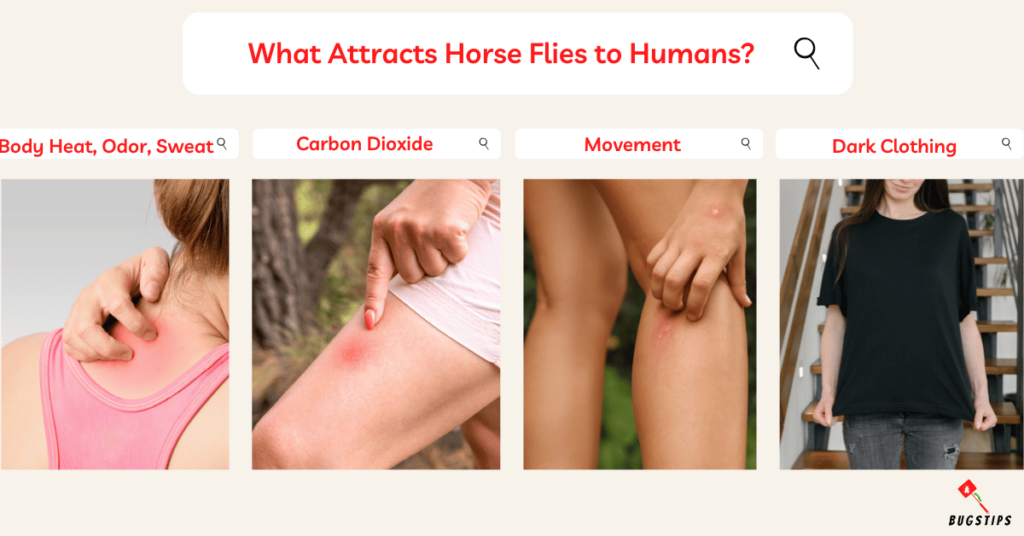
Body Heat
- Horse flies are highly sensitive to body heat, and humans emanate a considerable amount of warmth.
- This warmth signals a potential blood meal to the hungry horse flies, making us an attractive target.
Carbon Dioxide
- Like many other blood-feeding insects, horse flies are drawn to the carbon dioxide we exhale when breathing.
- They can detect the presence of carbon dioxide from a distance, which helps them locate potential hosts.
You May Also Like – Do Ticks Die in the Winter?
Movement
- Horse flies are attracted to movement.
- They are highly visual and can detect movement from a long distance.
- When a horse fly spots a moving target, it will follow it until it lands.
Sweat and Body Odor
- Sweat and body odor release certain chemicals that can be appealing to horse flies.
- These scents can be especially attractive to them, increasing the likelihood of encountering these persistent insects.
Dark Clothing & Contrasting Colors
- Horse flies are attracted to dark colors.
- Wearing dark clothing can make you more attractive to horse flies.
- Along with dark clothing, horse flies are also attracted to contrasting colors, such as black and white patterns.
- This attraction to contrasting colors can explain why they may sometimes target specific clothing patterns.
UV Light Reflection
- Horse flies are sensitive to ultraviolet (UV) light reflection.
- Certain materials or surfaces that reflect UV light more intensely might catch their attention and lead them towards us.
Presence of Water
- Some species of horse flies, particularly those known as “clegs,” are associated with water sources like rivers, ponds, and marshes.
- Being near water increases the chances of encountering these specific horse fly species.
You May Also Like – Get Rid of Fruit Flies in Fridge
Why Do Horse Flies Only Bite me and Not Others?
If you find yourself getting bitten by horse flies more often than others, it could be due to a few different factors.
As explained above It’s possible that you may be exhaling more carbon dioxide, have a stronger body odor, or be wearing darker clothing, all of which can make you more attractive to horse flies.
However, it’s also possible that genetics play a role.
Some people may be more prone to getting bitten by insects due to their genetics, and if your parents or other family members are also prone to getting bitten, it’s possible that genetics are a factor.
That being said, it’s also possible that getting bitten more often is just a random coincidence.
While certain factors can make you more attractive to horse flies, there’s no way that you’ll get bitten every time you’re in an area where horse flies are present.
Related Article – 12 Tiny Black Bugs on Window Sill
Do Horse Flies Drink Your Blood?
Yes, horse flies are bloodsucking insects that feed on the blood of mammals, including humans.
However, it’s important to note that only female horse flies bite to obtain blood.
They possess blade-like mouthparts that slash tissues and blood vessels, creating wounds from which blood flows.
Once the wound is created, females use their sponge-like mouthparts to suck up the blood, nourishing themselves for their reproductive needs.
You May Also Like – How to Get Rid of Crane Flies
Do Horse Flies Lay Eggs in Humans?
No, horse flies do not lay eggs in humans.
Instead, female horse flies lay their eggs in moist environments such as pond, marshes, creeks, shores, and even termite mounds, waterfalls, or beach dunes.
They typically deposit egg masses on wet soil or vegetation that overhangs water.
While horse flies are known to bite humans to obtain blood, they do not utilize humans as hosts for their eggs.
What to Do if a Horse Fly Bites You?
If you find yourself on the unfortunate receiving end of a horse fly bite, there are several steps you can take to alleviate discomfort and promote healing.
Here’s what to do if a horse fly bites you.
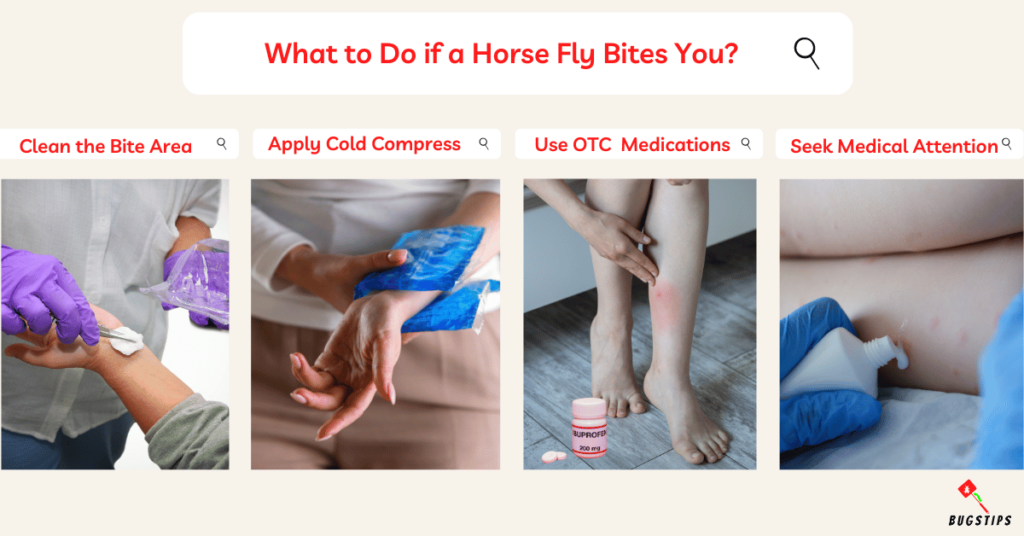
Clean the Bite Area
- Wash the affected area with mild soap and water to cleanse the wound.
- Gently pat it dry with a clean towel.
Apply Cold Compress
- To reduce swelling and soothe the bite, apply a cold compress or ice wrapped in a cloth to the area.
- Avoid placing ice directly on the skin to prevent ice burn.
Use Over-the-Counter Medications
- Topical creams containing hydrocortisone or antihistamines can help relieve itchiness and inflammation.
- If the bite is particularly painful, you may take over-the-counter pain relievers like ibuprofen or acetaminophen as directed to manage discomfort.
Use Anti-itch Creams
- If the bite is intensely itchy, consider using anti-itch creams or lotions to relieve the urge to scratch.
Seek Medical Attention
- If you experience severe symptoms, such as difficulty breathing, chest pain, or a widespread allergic reaction, known as anaphylaxis, seek immediate medical help.
Avoid exposing the bite to dirty or wet environments, as this could increase the risk of infection. Keep the area clean and dry. And If the bite is on a limb, elevating it can help reduce swelling.
Related Article – 8 Bugs That Look Like Flying Termites
How to Prevent Horse Fly Bites
Preventing horse fly bites can make your outdoor activities more enjoyable and reduce the chances of discomfort from these pesky insects.
Here are some effective measures to prevent horse fly bites.

Wear Light-Colored Clothing
- Horse flies are attracted to dark colors, so wearing light-colored clothing can make you less attractive to them.
- Also Wear long-sleeved shirts, long pants, and hats to minimize exposed skin, making it harder for horse flies to find a spot to bite.
Use Insect Repellent
- Reapply as necessary, following the instructions on the product label.
Use Fly Traps
- Set up commercial horse fly traps around your outdoor spaces to lure and capture these insects, keeping their population in check.
Install Screens
- You can also use mesh screens or netting around your outdoor living areas to keep horse flies and other insects at bay.
Create a Breezy Environment
- Horse flies are not strong fliers and avoid windy conditions.
- If possible, set up fans or create a breezy environment to deter them.
Avoid Strong Fragrances
- Perfumes, scented lotions, and fragranced products can attract horse flies.
- Use unscented products to minimize their interest in you.
If possible, avoid areas where horse flies are known to be prevalent, especially during peak activity times, which are typically during the hottest parts of the day. And Horse flies are often found near water sources, so avoiding areas with standing water can reduce the chances of encountering them.
Related Article – Bugs in Mailbox: 10 EASY Ways to Keep Them Out
Final Thoughts
Horse flies are bloodsucking insects that can cause pain and discomfort when they bite.
While horse fly bites are generally not life-threatening to healthy individuals, they can be dangerous in rare cases.
Horse fly bites can trigger an allergic reaction, and horse flies can also transmit diseases to both humans and animals.
To reduce your risk of getting bitten by horse flies, take precautions such as wearing light-colored clothing, using insect repellent, and avoiding areas where horse flies are prevalent.
If you do get bitten, there are steps you can take to alleviate the symptoms, including cleaning the bite and using over-the-counter medications.
So, if you do get bitten by a horse fly, don’t be scared or panic. With proper care, you can recover from a horse fly bite without any long-term effects.
FAQs
Can a horse fly kill you?
No, horse flies cannot kill humans. Their bites may cause discomfort, but they are not lethal.
Can you kill a horse fly?
Yes, horse flies can be killed like any other insect, but prevention is a better approach.
What does a horse fly bite look like?
A horse fly bite appears as a raised, red, and itchy bump on the skin.
How painful is a horse fly bite?
Horse fly bites can be very painful due to their scissor-like mouthparts.
Do horse flies have teeth?
Horse flies have blade-like mouthparts, not teeth.
Can horse flies bite through clothing?
Yes, horse flies can bite through thin clothing.
How long does a horse fly bite last?
Horse fly bites usually last a few days but can vary depending on the individual.
What should I do if I’m allergic to horse fly bites?
Seek medical attention immediately for severe reactions or allergies.
How can I treat horse fly bites at home?
Clean the bite area, apply cold compress, and use OTC creams for relief.
What happens if you swallow a horse fly?
Swallowing a horse fly is generally harmless and will pass through the digestive system.
Are horse flies only active during summer?
Yes, horse flies are most active in warm weather, especially during summer.
Can horse flies kill a horse?
Horse flies can be annoying and harmful to horses but rarely kill them.
Resources – (for further reading)
Wikipedia – Tabanidae
University of Maine Cooperative Extension – Horse Flies – Home and Garden IPM
University of Wisconsin–Milwaukee – Horsefly – Field Station

